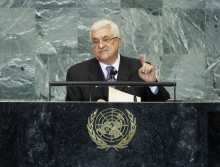Former Venezuelan leader Hugo Chavez, known for his anti-West rhetoric and friendship with Iran, was memorialized by a leader half a world away this week: Palestinian President Mahmoud Abbas. Chavez, whose government was accused of backing terrorists in Columbia and human rights abuses, died of cancer.
The Palestinian WAFA news agency reported that Abbas praised Chavez in a statement of condolence. WAFA paraphrased Abbas as saying that “this tragic loss will motivate the Venezuelans’ to carry on and pursue their progress and prosperity as well as carry on all the values, especially of freedom, that late Chavez has carried and struggled for.”
The organization Human Rights Watch, however, characterized Chavez very differently in slamming his record on curtailing democratic freedoms. In an article on HRW’s website, the group specifically noted Chavez’ taking control of the judicial system and his attack on free speech.
“By his second full term in office, the concentration of power and erosion of human rights protections had given the government free rein to intimidate, censor, and prosecute Venezuelans who criticized the president or thwarted his political agenda,” said the HRW article.
In his statement, Abbas pointed to Chavez’ support for the Palestinian’s upgrade to non-member state status at the United Nations in calling Chavez a friend. The Palestinians weren’t the only friends Chavez had in the Middle East.
Chavez repeatedly defended Iran in speeches and statements, visiting the Islamic Republic and welcoming Iranian President Mahmoud Ahmadinejad in a visit to Venezuela. In addition, the Lebanese Hezbollah terrorist group has long been suspected of having activity in the South American country.
While it is not unusual for statements of condolence to be offered after the passing of a national leader, Abbas’ effusive statement contrasted sharply with that of the United States. President Barack Obama, in comments released by the White House, referred to Chavez’ death as a “challenging time,” but said nothing else about the divisive dictator.
“The United States reaffirms its support for the Venezuelan people and its interest in developing a constructive relationship with the Venezuelan government,” said Obama. “As Venezuela begins a new chapter in its history, the United States remains committed to policies that promote democratic principles, the rule of law, and respect for human rights.”
(By Joshua Spurlock, www.themideastupdate.com, March 7, 2013)

